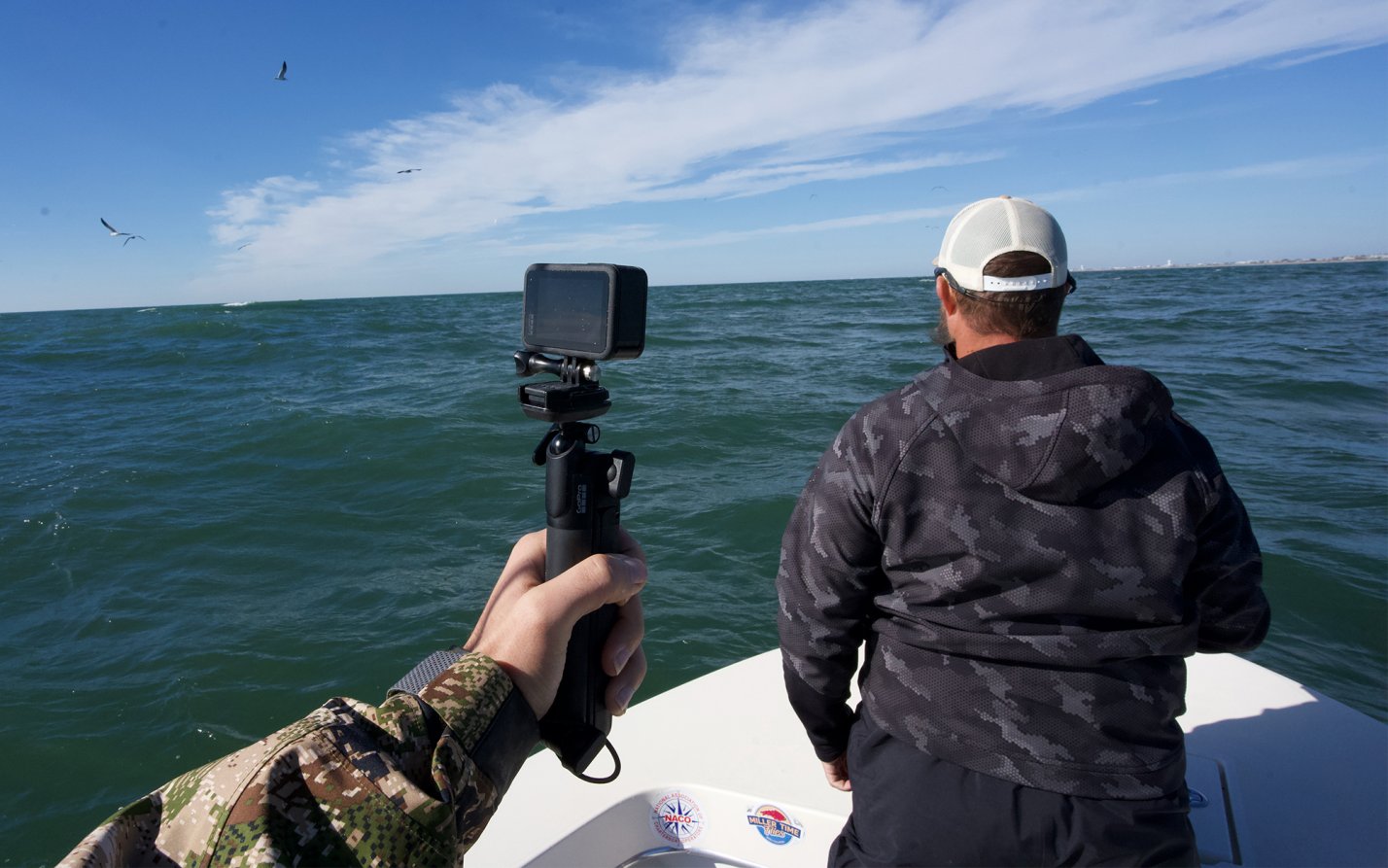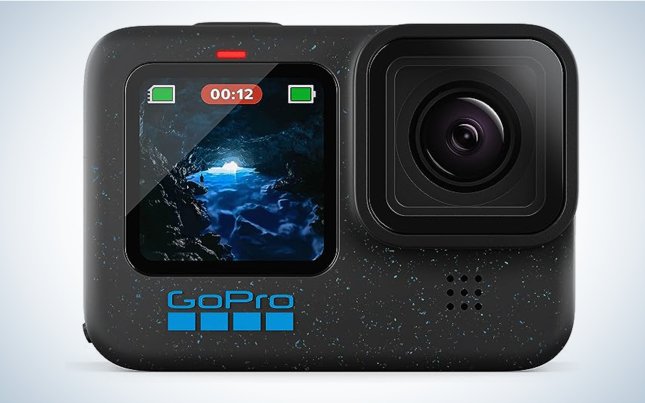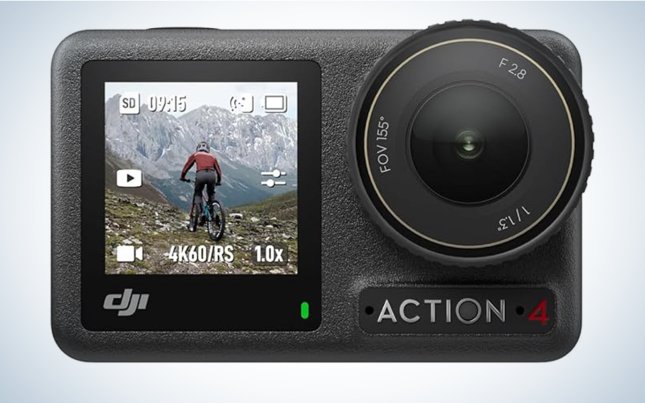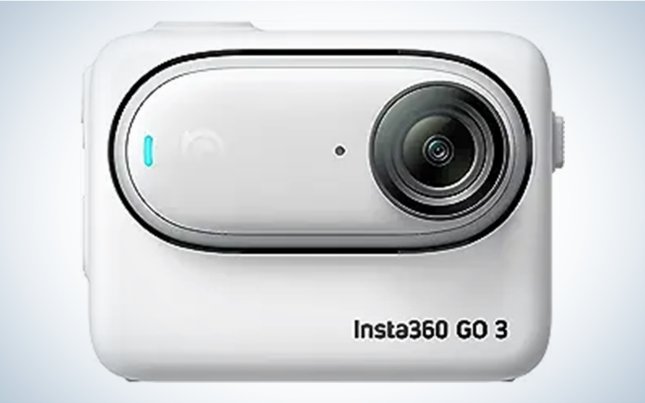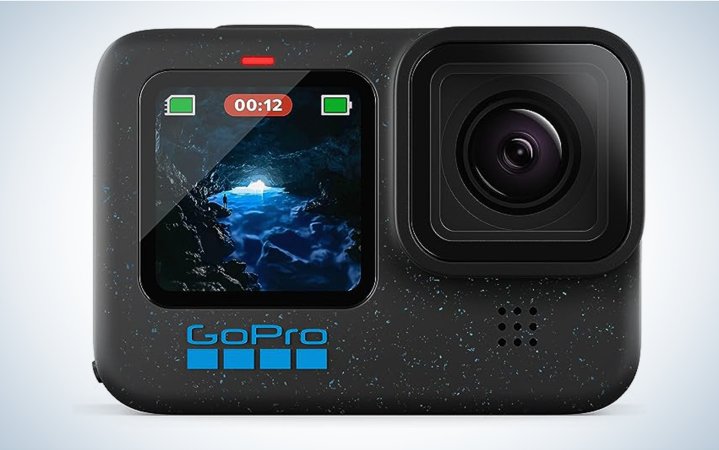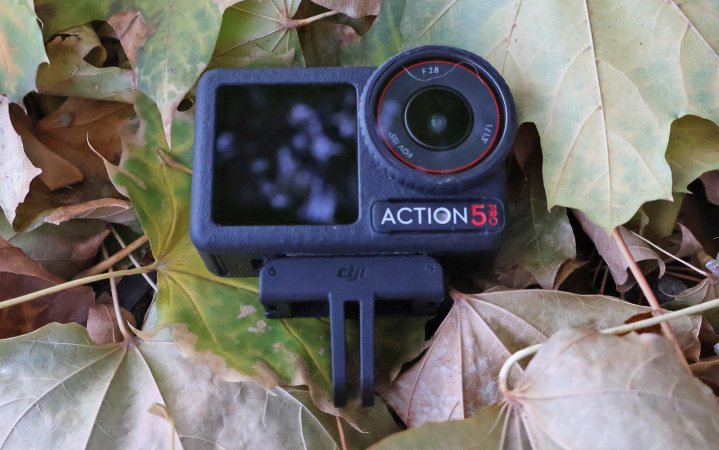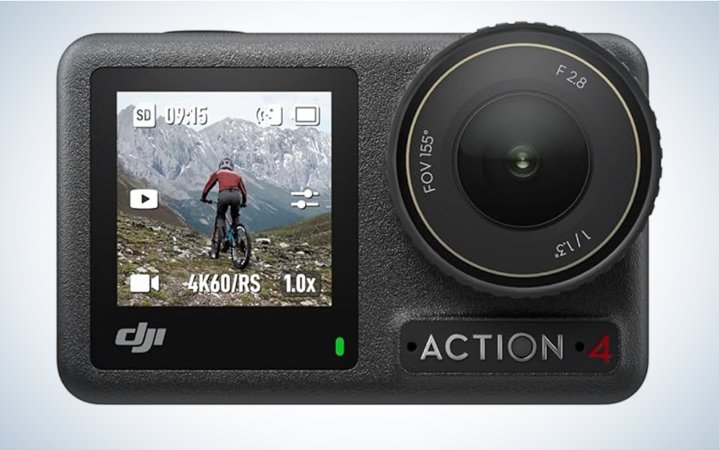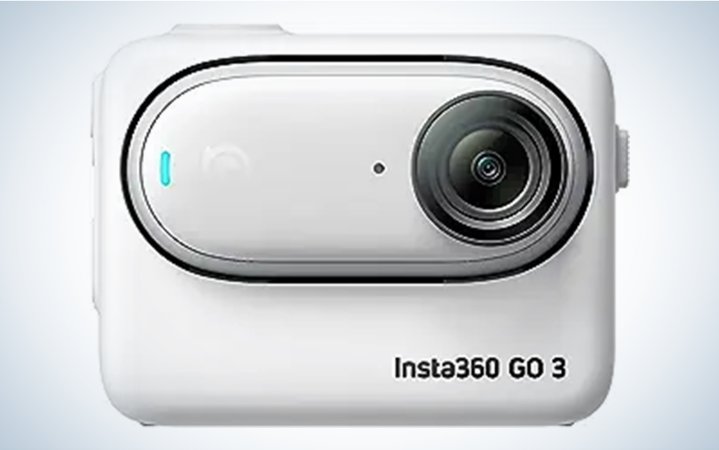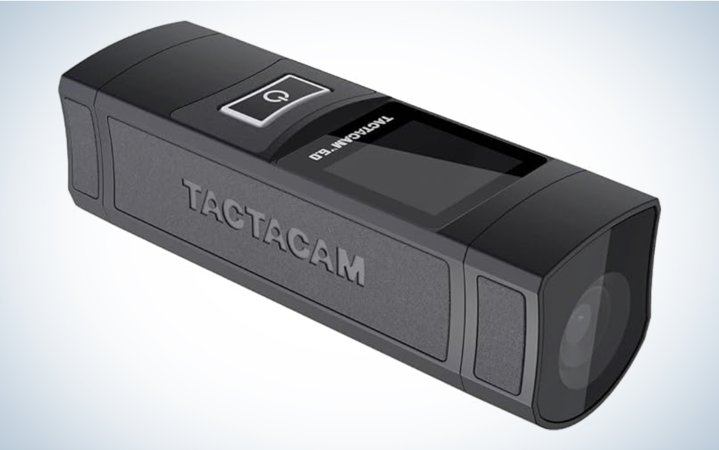We may earn revenue from the products available on this page and participate in affiliate programs. Learn More ›
Sure, a Red Raptor shoots insane footage, but you probably don’t want to carry it up a mountain or need 8K,120 fps footage. For those of us who want to capture memories of doing epic outdoor activities, action cameras provide good video quality in small, weatherproof packages. Here are three of the best action cameras to consider.
- Best Overall: GoPro Hero 12 Black
- Easiest to Use: DJI Osmo Action 5 Pro
- Best for Low Light: DJI Osmo Action 4
- Smallest: Insta 360 Go 3
- Best for Hunting: Tactacam 6.0
How I Chose the Best Action Cameras

I’ve been a prolific user of GoPros to film while fishing from my kayak or capture a second point of view while filming hunts. I’ve recently added a Tactacam to my camera bag to capture through the scope footage. I used my experience filming with those action cams as well as mirrorless cameras to evaluate the best action cameras on the market.
Best Action Cameras: Reviews & Recommendations
Best Overall: GoPro Hero 12
Pros
- A lot of accessories available
- Excellent for hands free filming with voice commands
- Interchangeable batteries
Cons
- Not the best option for low light
- Touch screen can be unresponsive in cold weather
Key Features
- Weight: 154 grams
- Waterproof to 33 feet without protective housing
- ¼-20 mount and GoPro mount
- 1/1.9 inch CMOS sensor
- Shoots In: 5.3K, 4K, 2.7K, and 1080p
- Frame Rates: 240, 200, 120, 100, 60, 50, 30, 25, 24 f
- Time lapse includes timewarp, star trails, light painting, and more
- Photo: 27.13mp
- 3.5mm audio mic input with media mod for hero12 black or pro 3.5 mic adapter (sold separately)
- Batter Type: Removable 1720mah enduro
- WiFi and Bluetooth
- Voice control
- 14 commands
GoPros have always been used as crash cams and a second point of view in tight places, but they’ve come a long way. The GoPro Hero 12 can shoot pro-level footage at 5.3K and incredible slow motion at 4K 120 fps. It also shoots really nice photos (27 megapixels) for a video camera.

If you have an older GoPro, one thing you’ll appreciate in the new cameras is you no longer need to use a cage to mount your camera to GoPro accessories. The mount is built-in and flips out from the bottom of the camera. It’s a smart design and a significant improvement because you don’t need to take off a cage to swap batteries.
The Hero 12 has a wide 156-degree field of view in the 8:7 aspect ratio. You can push it wider using the Max Lens Mod 2.0, which gives you a 177-degree field of view. You can also put the Hero 12 into vertical mode for easier editing for social videos.
The Hero 12 has a 1/1.9-inch CMOS, for perspective an iPhone 14 has a 1/1.9-inch sensor. So it’s right on par with one of the most common smartphones. Another notable feature is scheduled capture, which lets you set the time you want the GoPro to start recording so you’ll never miss another sunrise video when you want to hit the snooze button.

Honorable Mention: GoPro Hero 10 Black
If you want to save some money, check out the GoPro Hero 10 Black, which shoots awesome footage. The above Hero 10 sample footage is straight out of the camera with no color grading or adjustments. It’s a 4K project, and some footage was shot in 5K. I edited the footage using the free GoPro Quick app on my phone. I’ll let the footage speak for itself, but you’ll see how the camera performed in low light, bright sun, and filming directly at the sun. It’s also worth noting that the video was filmed on a moving boat in rough conditions. All the footage was shot without a gimbal, and it’s a testament to the Hero 10’s advanced in-camera stabilization. Now the Hero 13 Black is out with 5.3K video resolution.
Easiest to Use: DJI Osmo Action 5 Pro
Pros
- Built-in storage
- Longest battery life
Cons
- 4K vs GoPro Hero 13’s 5.3K video resolution
Key Features
- Weight: 146 grams
- Waterproof to 65 feet without the waterproof case, 196 feet with the case
- 47 GB of internal storage, and compatible with micro SD cards
- Photo ISO Range: 100-25,600
- Video ISO Range: 100-51,200
- Shoots In: 4K, 2.7K, and 1080p
- Frame Rates: 24, 25, 30, 48, 50, 60, 100, 120, 240
- Slow motion, timelapse, and hyperlapse modes
- Photo Formats: JPEG and RAW
- Video Format: MP4 (HEVC)
- Battery Type: LiPo 1S (240 minute run time)
- WiFi and Bluetooth
I used this Action Cam to film my mountain biking progression, and cool features my bike partner hit this season. At first I struggled to get the positioning right, but the hack is to mount the camera upside down and angle it upwards to get more trail and less downstem in your shots. This camera has a quick and easy to use interface with cool features like slow motion, hyperlapse, timelapse, and subject tracking.
My favorite thing about this camera is how easy it is to use. The battery lasts around four hours, and I never had to bother switching it out. The Osmo Action 5 Pro also comes with 47 GB of built-in storage. That means you don’t have to fiddle with an SD card. That much internal storage should last you until your battery dies before you’d have to pull your footage off to keep shooting.
You can pull this camera out of the box and start filming immediately. The plethora of accessories give you the option to film anything with crisp and stable video quality. —Ashley Thess
Best for Low Light: DJI OSmo Action 4
Pros
- Fast and easy to navigate menu
- Excellent low light capability
Cons
- 1080 240 FPS vs Hero 12’s 2.7K 240 FPS
Key Features
- Weight: 145 grams
- Waterproof to 59 feet
- Uses Micro SD Cards
- ISO Range: 100 to 12,800
- Shoots In: 4K, 2.7K, and 1080p
- Frame Rates: 24, 25, 30, 48, 50, 60, 100, 120, 240
- Timelapse and hyperlapse modes
- Photo Formats: JPEG and RAW
- Video Format: MP4 (H.264/HEVC)
- Battery Type: LiPo 1S (160 minute run time)
- WiFi and Bluetooth
You’re likely comparing the Action 4 to the GoPro Hero 12 because they’re both at the top of the action camera market. The GoPro took best overall because it has higher resolution, better slow motion, and better image stabilization. But, the Action 4 takes the win on low light capability. It has a larger sensor that gathers more light and produces much less noise when the ISO is pushed to the max or when you have a lot of dark shadows. That better light gathering capability is also a benefit if you’re filming underwater. Both cameras are the same price and have a great line of accessories to support them—mounts, mics, ND filters, and gimbals.

The DJI and GoPro flagships are very close in capability. It ultimately comes down to which features you value the most. If low-light capability is very important to you then definitely go with the Action 4. If slow motion and high-res are important to you, go with the Hero 12.
Smallest: Insta 360 Go 3
Pros
- Instantly mounts to anything metallic via magnets
- Good accessories
- Easy post editing
Cons
- Exporting image stabilized footage takes a long time
Key Features
- GO 3 Weight: 35.5 grams
- Action Pod Weight: 96.3 grams
- Waterproof to 16 feet (camera only)
- Aperture: F2.2
- 35 mm equivalent focal length
- Shoots In: 2.7K, 1440P, 1080P,
- Frame Rate: 24, 25, 30, 50, and 120
- Photo Format: INSP or DNG
- Video Format: MP4
- ISO Range: 100 to 3200
- Can record vertical videos (9: 16)
- WiFi and Bluetooth
While it’s easy to compare the Hero 12 and DJI Action 4, the Insta 360 Go is its own category of action cam. The camera has two pieces: the camera and a viewfinder body with a flip up screen. The camera can work when attached to the body or it can be detached and clipped onto a hat or some other accessory, while still sending images to the viewfinder. One thing to know is that there is a slight lag between the camera and viewfinder. If you’ve ever used the GoPro app as a viewfinder, you know what I’m talking about.

The camera has excellent stabilization, especially the post stabilization added in the Insta360 Go app. It also has horizon leveling so you don’t have to worry about giving the viewer sea sickness. It’s important to know that the camera body is not waterproof, but the camera is waterproof. So feel free to jump in the pool with the camera, just leave the viewfinder portion out of the water.
If you’re looking for a small action camera that’s easy to use, easy to mount, and can get shots other cameras can’t, the Go 3 is a really cool one to look at.
Best for Hunting: Tactacam 6.0
Best for Hunting
Tactacam 6.0
Pros
- Great accessories for mounting to bows, guns, and kayaks
- Image stabilization for recoil
Cons
- Not ideal for a body mount or handheld use
Key Features
- Up to 8x zoom
- Touch screen display
- Adjustable red dot feature
- Image stabilization
- 4K at 60fps
- One touch operation with vibration indication
- Waterproof to 30 feet
- Tactacam remote compatible
- WiFi

The Tactacam lineup is designed with hunters and anglers in mind. Their accessories are some of the best for easily recording your adventures by mounting the camera to your bow or gun. There’s no messing with uncomfortable head mounts or camera arms, the camera records whatever your weapon is pointed at. The camera uses vibration notifications to let you know it’s recording or has changed modes, which is a welcome change from most action cams which use beeps or are completely silent. If you’re looking for an easy way to record your hunts, the Tactacam 6.0 with one of the brand’s stellar mounts is a great way to.
How to Choose an Action Camera

Video Formats
The GoPro’s 5.3K is extremely impressive and excellent if you’re using your GoPro for B-roll viewed on a large screen. But, it’s not necessary for recording videos viewed on a phone. A camera that shoots in 4K or 1080 will produce high resolution video for social media, and save space on your phone.
Stabilization
Action cameras are meant to go do epic stuff that other cameras cannot do. A major consideration for that use case is stabilization—internal and in post. Watch a bunch of test footage on YouTube to see for yourself who has the best stabilization. But in my opinion, the GoPro Hero 12 has the best in-camera stabilization.
Mounting Options
Action cameras can be used handheld, but they’re most often mounted on things like the dash of an ATV, your body, gimbal, or bike handlebars. Consider how you’ll use the camera and how you’ll mount it because the compatible accessories are just as important as video specs.
FAQs
While GoPro makes the best action camera, in my opinion, there are better options for different use cases. For example: The DJI OSOMO Action 4 has better low light abilities, the Insta 360 Go 3 can get unique camera angles, and the Tactacam is specifically designed to film hunts.
DJI is currently GoPro’s biggest competition. They’re putting out cameras with similar prices and specs.
In my opinion, the GoPro Hero 12 has the best in-camera stabilization.
Final Thoughts on the Best Action Cameras
If your videos are shot on the water, on cliffs, and definitely not in a studio, you need an action camera. The best action camera for you will ultimately depend on your specific needs. If you’re looking for the best all around option get the GoPro Hero 12. If you want a unique and ultralight camera, the Insta 360 is a great choice. For low light capability the DJI Osmo is unmatched. Check out the options I’ve laid out and watch as much sample footage as you can before making your final decision.
- Best Overall: GoPro Hero 12 Black
- Easiest to Use: DJI Osmo Action 5 Pro
- Best for Low Light: DJI Osmo Action 4
- Smallest: Insta 360 Go 3
- Best for Hunting: Tactacam 6.0
